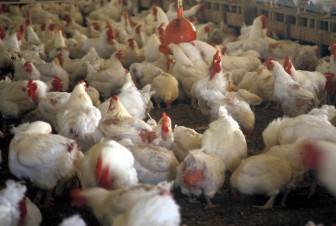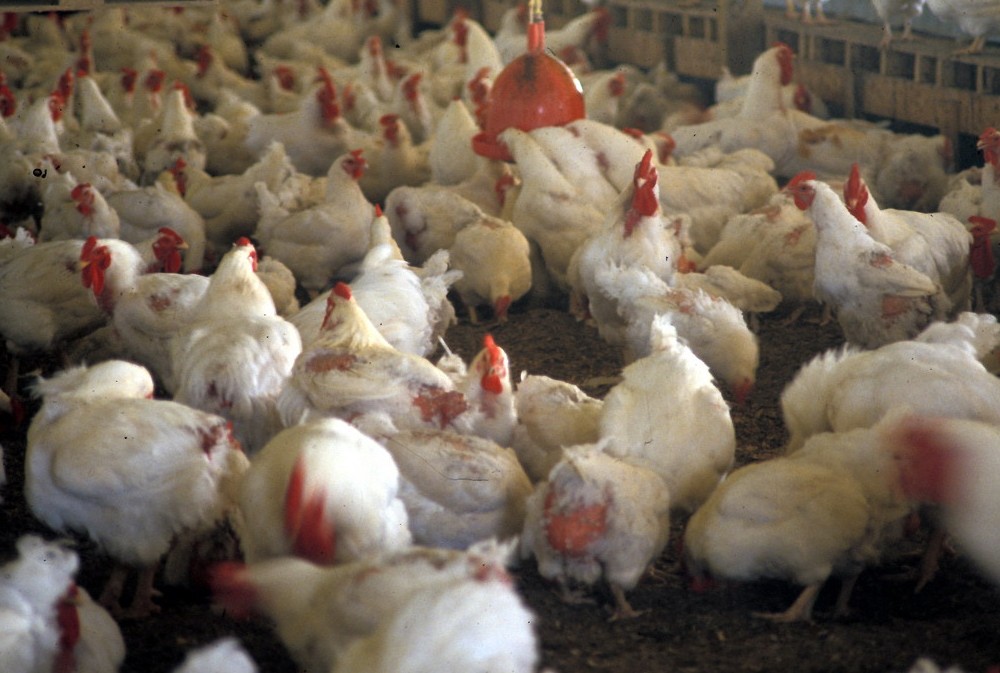By Bryan Renbaum
For MarylandReporter.com

Photo by chesbayprogram
Environmental activists clashed with Maryland’s agriculture secretary and the poultry industry over legislation designed to shift the burden of cleaning up excess chicken manure runoff from taxpayers and farmers to larger poultry companies.
Sen. Richard Madaleno, D-Montgomery, the bill’s sponsor, told the Education, Health and Committee Tuesday that current regulations are not sufficient. Those regulations are aimed at reducing the amount of nitrogen and phosphorous in the Chesapeake Bay — nutrients which can partially be attributed to chicken manure runoff from Eastern Shore farms.
He said that as the state finishes implementing its new Phosphorous Management Tool, new regulations will say an estimated 228,000 tons of chicken litter will not be able to be disposed of on the Eastern Shore.
“We have to find a way to deal with it,” Madaleno said. “Just placing it on the backs of the contract growers is the not the fairest way to move forward because they are not the cause of the problem and they are the ones totally responsible for cleaning up the problem.”
The Poultry Litter Management Act, SB496, has 13 Democratic co-sponsors, including committee chair Joan Carter Conway and vice-chair Paul Pinsky. It shifts the burden of disposal and delivery of manure to a person or company that owns poultry raised by a contract grower, instead of the grower having to handle it.
The owner would be required to follow previously agreed certified nutrient management plans to do so, and the bill would also allow contract growers to sue poultry manufacturers for potential violations.
Senate President Mike Miller pleaded from the rostrum today for the senators to listen to both sides at Tuesday’s hearing, because the bill has become a contentious issue.
Maryland Ag secretary testified against bill
Maryland Agriculture Secretary Joseph Bartenfelder asked the committee to reject the bill, stating it was unnecessary and that current Phosphorous Management Tool regulations implemented just last June have resulted in significant progress.
That tool identifies farm fields with the highest potential risk of excess phosphorus and is intended to limit buildup in soils that already have high levels of the nutrient.
“Let us do our job, let us work with all of you; there’s no need for this bill at this time and [let’s] keep the value of that poultry manure where it is, where it’s been, and that’s with the farmer,” Bartenfelder said.
Major Maryland industry player Perdue Foods also opposed the bill.
Stephan Levitsky, vice president of sustainability at Perdue Farms Inc., said the company is environmentally conscious and that the proposed bill would not be effective.
“We protect our environment, live up to our civic responsibilities, ensure the wellbeing of our associates, and generate earnings for the future of our company.”
“I am here today to speak to concerns that poultry farmers are burdened with excess poultry litter and that the recently enacted Phosphorous Management Tool, or PMT, will result in significantly more litter that cannot be applied to farm fields and thus in higher costs to taxpayers,” Levitsky said.
Environmental groups say bill solves implementation issues with regs
Doug Myers, Maryland senior scientist for the Chesapeake Bay Foundation, testified in favor of the bill, saying it supplements existing regulations that need to be upgraded and solves implementation challenges of the Phosphorus Management Tool. He said that as the Phosophorus Management Tool is phased in to determine which fields are able to accept additional manure, the distances and volumes of manure will grow.
Claire Fitch, a program officer with John Hopkins University’s Food System Policy Program at the Bloomberg School of Public Health, spoke of health hazards associated with boiler houses where chickens are kept prior to slaughter.
“A single boiler house can now hold up to 60,000 birds and oftentimes there are multiple boiler houses located on a single parcel of land,” Fitch said.
Fitch also said that boiler houses emit harmful chemicals such as nitrates, which if ingested could potentially cause diabetes, multiple types of cancers, and birth defects.
Questions if research is up-to-date
Sen. Stephen Waugh, R-Calvert & St. Mary’s, questioned the veracity of the panel’s research, suggesting it was outdated because it did not include documentation subsequent to last year’s PMT regulations and expressed doubt about previously described health hazards.
“Have any of these studies been done since the PMT regulations have changed — that we caused to be changed from legislation last year,” Waugh asked.
“Can you point to specific increases, for example, in thyroid conditions, birth defects, diabetes, cancers, etc?”
The panel could not answer the question as their research concluded in FY 2015.
Dr. Bruce Stewart-Brown, senior vice president of food safety, quality and live production at Perdue Foods, and is also a veterinarian, sought to counter claims about potential health concerns related to production.
“Perdue is the industry leader in reducing the use of antibiotics in chicken production. We stopped using antibiotics for growth promotion back in 2007 and in 2014 finished taking antibiotics out of our hatcheries,” Brown said. “Today, more than two-thirds of our chickens and more than half our turkeys are raised without any antibiotics at all, what we call No Antibiotics Ever, or NAE.”
Bryan Renbaum can be reached at: [email protected]



This proposed legislation is simply another effort to bash the poultry industry, just two years after poultry growers have begun to implement regulations that are designed to have the same effect as this new legislation! People, do you not know that legislating operational changes in an industry (or even human behavior) takes just as much time as regulatory change? This is another example of why Maryland is perceived as one of the top five “WORSE STATES” for industry. Unfortunately, a large number our legislators will take any opportunity, such as this one, to bash “Big Bad Industry” to make themselves look good to their constituency. Civility people, civility. Base decisions on sound science and economics.
Hey liberal Maryland Democratic legislators and their loony environmental supporters, kiss another Maryland industry good bye as the large poultry farms move to Delaware etc.
But, the chicken crap will still be left behind in the Democratic Maryland Legislature, especially by those Montgomery County Senators and Delegates that are experts at raising chickens in Rockville MD!